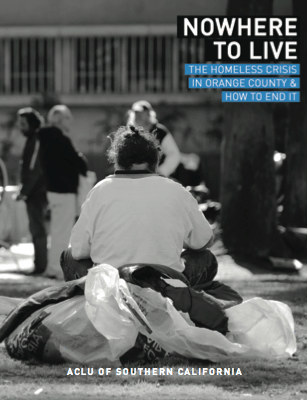The following was first published in the Voice of OC.
Orange County has long been a national symbol of affluence.
Its median income ranks among the top 3 percent of all counties nationwide. It boasts a county budget topping $3 billion. Its economy is larger than more than half of all U.S. states.
It is also plagued by a grinding and deadly homelessness crisis that gets worse by the day. With all of the resources at its disposal, why, then, can’t the county find an effective way to help thousands of its most vulnerable residents?
A new report (Download .pdf) by the ACLU of Southern California asks that and many other questions —and astoundingly, elected officials in this rich and resourceful county cry poverty. “It’s not for lack of sympathy and understanding that our hands are tied,” Board Supervisor Shawn Nelson argued during a recent budget hearing, “Orange County does not have the ability to do what other counties have done.”
To its credit, the county hasn’t ignored the issue. In 2010, the Board of Supervisors approved a Ten-Year Plan to End Homelessness, which called for creating more permanent affordable housing—a strategy that studies show is the most effective way to end homelessness. But the ACLU SoCal report finds that today, more than six years later, the county is failing to follow its own blueprint.
County officials originally drew up the Ten-Year Plan to qualify for homelessness services from the U.S. Department of Housing and Urban Development. But stagnant or shrinking state and federal funds don’t come close to meeting the need. The ACLU SoCal report estimates that Orange County could effectively end homelessness by spending about $55 million per year above what it receives from federal and state sources. That represents only 1.7 percent of the county’s $3.2 billion budget.
As county officials steadfastly refuse to step up investments in local resources that are key to the Ten-Year Plan’s success, thousands of people literally have nowhere to live. The number of people experiencing homelessness per year increased by 20 percent from 2013 to 2015, local encampments are exploding, and according to Orange County Sheriff-Coroner data, the number of homeless deaths per year doubled from 2009 to 2015.
As noted in the ACLU SoCal report, affordable housing waitlists drag on for years, and the development of permanent supportive housing doesn’t come close to meeting the demand. Given the county’s sky-high rents, market-rate housing is simply out of reach for people experiencing homelessness.
The county’s refusal to spend money on real solutions to these problems will end up costing the taxpayers even more. Permanent affordable housing is ultimately cheaper than the expense of jail time, emergency room treatment and other harsh measures faced by individuals who are chronically homeless. Given that only 0.14 percent of the Orange County’s population is homeless—lower than the national average of 0.18 percent—the overall cost of housing them is minimal.
Orange County would do well to follow the example of cities, counties, and states that have successfully reduced homelessness by creating dedicated sources of funding to support housing-first strategies. Housing trust funds are one example—they are designed to bring in dedicated sources of funding for affordable housing, such as fees or loan repayments. The county, cities, corporations, and philanthropic organizations could contribute to the fund to support a coordinated, regional solution to homelessness.
Housing is critical to ending homelessness, but it is only part of the picture. Orange County must reverse course on policies that criminalize homelessness. The county and 33 out of its 34 cities have passed misguided laws that ban innocent behaviors that homeless individuals cannot avoid, such as sleeping and camping in public.
These laws don’t fulfill their intended purpose, namely, to rid cities of homeless people. Because almost all Orange County cities have ordinances on the books that criminalize, there are few options for relocation and many people decide to stay in place and put up with police harassment.
Such policies only exacerbate the homelessness crisis by ensnaring people in the criminal justice system. People may find it more difficult to escape homelessness when they are burdened with hefty court fees and fines for violating nuisance ordinances and traumatized by police harassment. To get a little relief, some end up in isolated places such as dry riverbeds, foothills, and remote industrial areas, where they are both socially and geographically marginalized. Pushed into the margins, many lack basic necessities, such as food, restroom facilities, and even fresh drinking water.
The report urges the county to take a leadership role in ending these harmful policies. It should follow the federal government’s lead in condemning criminalization, repeal ordinances that criminalize homelessness, and in allocating federal, state, and local funds, give priority to cities that do not criminalize homelessness.
The fact is, there is nothing preventing Orange County from scaling up their housing-first strategy and ending homelessness for good, except the political will to do so.
Eve Garrow is homelessness policy analyst and advocate at the ACLU of Southern California.


